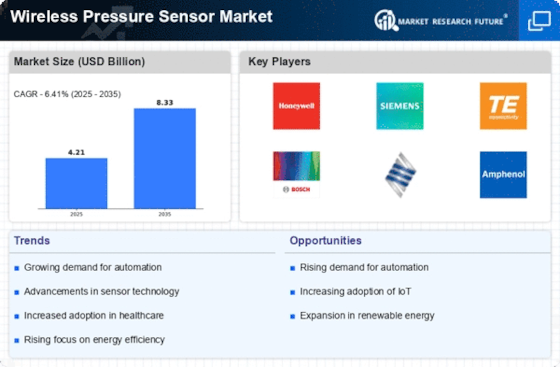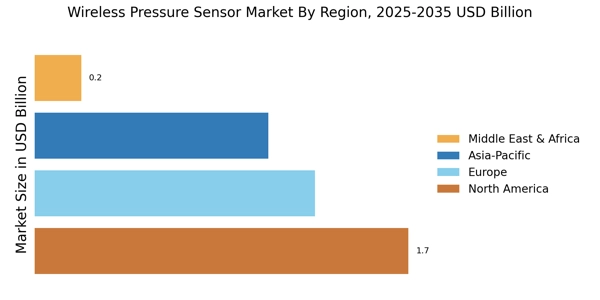Growing Industrial Automation
The Wireless Pressure Sensor Market is significantly influenced by the growing trend of industrial automation. As industries seek to enhance productivity and reduce operational costs, the adoption of automated systems is becoming increasingly prevalent. Wireless pressure sensors are integral to these systems, providing essential data for process control and monitoring. The market is projected to grow at a CAGR of approximately 7% as more companies invest in automation technologies. This growth is indicative of the potential for wireless pressure sensors to facilitate real-time monitoring and improve decision-making processes across various industrial applications, thereby driving overall market expansion.
Expansion in Automotive Sector
The Wireless Pressure Sensor Market is experiencing notable growth due to the expansion of the automotive sector. With the increasing adoption of advanced driver-assistance systems (ADAS) and electric vehicles (EVs), the demand for reliable and accurate pressure sensors is escalating. These sensors play a crucial role in monitoring tire pressure, engine performance, and other critical parameters. Market forecasts suggest that the automotive segment could witness a growth rate of around 9% over the next few years, driven by the need for enhanced safety features and improved vehicle performance. This trend indicates a promising opportunity for manufacturers to develop specialized wireless pressure sensors tailored to the automotive industry's unique requirements.
Integration with Advanced Technologies
The Wireless Pressure Sensor Market is experiencing a notable shift towards the integration of advanced technologies such as the Internet of Things (IoT) and artificial intelligence (AI). This integration enhances the functionality and efficiency of pressure sensors, allowing for real-time data collection and analysis. As industries increasingly adopt smart technologies, the demand for wireless pressure sensors is projected to grow. According to recent estimates, the market is expected to reach a valuation of approximately 3 billion USD by 2026, driven by the need for automation and improved operational efficiency. This trend indicates a significant opportunity for manufacturers to innovate and develop more sophisticated wireless pressure sensors that cater to the evolving needs of various sectors.
Rising Demand in Healthcare Applications
The Wireless Pressure Sensor Market is witnessing a surge in demand from the healthcare sector, particularly in applications such as patient monitoring and medical devices. The ability to remotely monitor patients' vital signs, including blood pressure, has become increasingly critical in modern healthcare. This trend is supported by the growing emphasis on telemedicine and remote patient management, which has led to an increased adoption of wireless pressure sensors. Market data suggests that the healthcare segment is anticipated to account for a substantial share of the overall market, with projections indicating a compound annual growth rate (CAGR) of around 10% over the next few years. This growth reflects the potential for wireless pressure sensors to enhance patient care and streamline healthcare operations.
Focus on Energy Efficiency and Sustainability
The Wireless Pressure Sensor Market is increasingly aligning with the global focus on energy efficiency and sustainability. As industries strive to reduce their carbon footprint and optimize resource utilization, the demand for energy-efficient pressure sensors is on the rise. Wireless pressure sensors, which often consume less power than their wired counterparts, are becoming a preferred choice for many applications. This shift is particularly evident in sectors such as manufacturing and environmental monitoring, where energy savings can lead to significant cost reductions. Market analysts indicate that the emphasis on sustainability could drive a market growth rate of approximately 8% annually, as companies seek to implement greener technologies and practices.
















